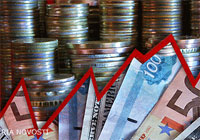Critic of Russian Economic Policy Ejected From Influential Journal

(Moscow Times – themoscowtimes.com – Delphine d’Amora – October 8, 2014) Prominent economist and Kremlin critic Sergei Alexashenko says that political pressure has forced him to surrender his post as editor and contributor to a respected macroeconomic bulletin published by Moscow’s Higher School of Economics.
“Someone doesn’t like what I write, what I do, where I live. And I have no right to put my friends and colleagues in harm’s way,” Alexashenko wrote in a letter declaring his resignation from the bulletin, news agency RBC reported Tuesday.
Alexashenko’s account of the events was confirmed by Natalya Akindinova, head of the Higher School of Economics’ Center for Development, which publishes the “Commentary on Government and Business,” a biweekly bulletin.
“Recently [Alexashenko] has actively expressed his political and civic stance, and so, truly, pressure was exerted on him,” Akindinova told The Moscow Times.
“I can’t name names … but for a person with such views, it is difficult to continue working in an organization that depends on the Russian government,” she said.
The Higher School of Economics (HSE) has a reputation as one of the last bastions of independent research and liberal thought in Russia, a status that appears to have come under threat as the Kremlin takes an increasingly strong line over the flow of information.
In the most widely publicized case of politics striking an institution of higher learning, last summer economist Sergei Guriev left his post as rector of Moscow’s New Economic School and fled to France, fearing he could be arrested in connection with his criticism of the decades-old trial against defunct oil company Yukos.
HSE has also been subject to politically dictated staff changes: In April, Vyacheslav Volodin, the Kremlin’s first deputy chief of staff, was appointed head of the research university’s supervisory board.
Alexashenko, an outspoken critic of Kremlin economic policies, served as deputy chairman of the Central Bank from 1995 to 1998 before moving into the private sector, where he worked in companies such as the Russian branch of investment firm Merrill Lynch.
He was appointed director of macroeconomic research at HSE in 2008.
A post published Tuesday on his blog for website Ekho Mosvky was a typical example of Alexashenko’s candor in a country where publicly criticizing the government can be a career-compromising game.
“The issue is that [President Vladimir] Putin, I don’t know whether consciously or not, is consistently destroying all government institutions, those things that make up the framework of government,” Alexashenko wrote.
In the same post, Alexashenko said the “essence” of Putin’s regime was “to hold on to power for as long as possible” and compared the Russian government to an “absolute monarchy.”
“Commentary on Government and Business,” the bulletin that Alexashenko left, is a biweekly analysis of the world and domestic economies written by HSE economists and frequently referenced in the Russian media. It has stood out in recent months for its less-than-positive take on the toll that Russia’s clash with the West is taking on the Russian economy.
In the last edition under Alexashenko’s supervision, the economist lambasted Russia’s Central Bank for failing to clearly state its monetary policy and intended response to ever-higher inflation.
In his resignation letter, Alexashenko said that the publication will continue on without him, and based on the edition published Tuesday, it appears to have retained its critical eye.
Noting the devaluation of the ruble, the falling price of oil and the speeding rate of inflation in Russia, the center’s head Akindinova concluded: “The Russian economy is moving on a crisis trajectory, and this process is for now only accelerating.”
